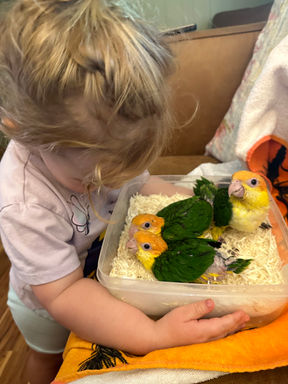The Ultimate Guide to Caring for Your Pet Parrot and Hand Fed Baby Parrots
The Ultimate Guide to Caring for Your Pet Parrot and Hand Fed Baby Parrots
Blog Article

Pet parrots are among the most fascinating and affectionate companion birds you can welcome into your home. Whether you’re a first-time bird owner or looking to expand your avian family, hand fed baby parrots offer a unique opportunity to bond closely from a young age. This guide will provide essential information on selecting, feeding, and caring for your pet parrot, with a special focus on hand fed baby parrots to ensure a healthy and joyful life.
Understanding Pet Parrots and Their Needs
Parrots are intelligent, social creatures that require specific care and attention to thrive as pets. Their long lifespan, playful behavior, and vocal nature make them rewarding but demanding companions. Whether you choose an African Grey, a Macaw, a Cockatiel, or another species, understanding their unique dietary and social needs is vital.
Why Choose Hand Fed Baby Parrots?
Hand fed baby parrots are chicks that have been nurtured and fed by humans from a very early age, rather than by their parents. This process helps the birds become more accustomed to human interaction, making them easier to socialize and train. These parrots are generally healthier and better adjusted to living in a domestic environment, as they receive personalized feeding and care.
Feeding Hand Fed Baby Parrots: Tips for Success
Feeding hand fed baby parrots requires precision and dedication. These birds rely on formula diets specially designed for growing chicks. Here are some feeding essentials to consider:
- Use a high-quality, species-appropriate hand-feeding formula.
- Maintain correct feeding temperatures to avoid crop infections.
- Feed on a strict schedule to mimic natural feeding patterns.
- Ensure cleanliness by sterilizing feeding utensils to prevent illness.
Caring for Your Pet Parrot
Beyond feeding, pet parrots need a stimulating environment that supports their mental and physical health. Providing toys, perches, and daily interaction can prevent boredom and behavioral issues. Regular veterinary check-ups are also essential to detect any health problems early.
Conclusion
Owning a pet parrot, especially a hand fed baby parrot, is a rewarding journey filled with companionship and joy. By understanding their specific care needs and investing time in proper feeding and socialization, you can help your feathered friend thrive. Remember, every parrot is unique, so patience and attention are key to a lifelong bond.
FAQs
Q1: What are the benefits of hand fed baby parrots compared to parent-raised birds?
A1: Hand fed baby parrots are typically more socialized and comfortable around humans, making them easier to train and handle. They also tend to adapt more quickly to new environments.
Q2: How often should hand fed baby parrots be fed?
A2: Frequency depends on the age but generally starts at every 3-4 hours for very young chicks, gradually decreasing as they grow older.
Q3: Can I feed my pet parrot a homemade diet?
A3: While fresh fruits, vegetables, and nuts are beneficial, it's important to use a balanced formulated diet to ensure all nutritional needs are met.
Q4: How do I know if my pet parrot is healthy?
A4: Signs of a healthy parrot include bright eyes, clean feathers, active behavior, and regular droppings. Regular vet visits are important for professional health checks. Report this page